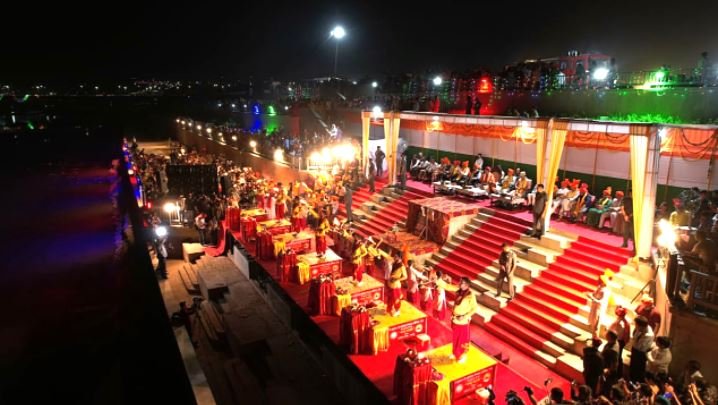The city of Jammu, revered as the “City of Temples,” has once again awakened to its spiritual core and cultural magnificence with the commencement of the Tawi Aarti at the Tawi Riverfront. Far more than a ceremonial event, this sacred gathering held on the auspicious occasion of Baisakhi represents a convergence of faith, history, and future aspiration. The grand Aarti, attended by people from diverse walks of life, was not merely an act of religious devotion but a profound expression of cultural reclamation and civic resurgence.
The symbolism embedded in the act of worshipping the Tawi—the Suryaputri River, considered sacred in local belief—is not lost on the people of this ancient city. For decades, the river had witnessed apathy, neglect, and environmental degradation. Once seen as a spiritual lifeline and ecological spine of the region, the Tawi had gradually receded from public consciousness, overshadowed by the growing clutter of urbanization. Yet, this revival of ritual at the riverfront signals a powerful shift—a movement from passive remembrance to active rejuvenation. In many ways, the Tawi Aarti is a compelling metaphor for Jammu’s attempt to balance its historical identity with its aspirations for a modern, inclusive, and sustainable urban future. The river, which once defined the rhythm of daily life and festivals in the region, is being repositioned not just as a natural resource but as a central axis of the city’s cultural and environmental ethos. Through this sacred observance, a message is being sent—not just to the citizens of Jammu but to every town and city across India—that urban progress does not have to come at the cost of cultural memory and ecological balance. The riverfront development project, carried out under the aegis of the Jammu Smart City initiative, has transformed the riverbanks into accessible, people-centric spaces. Green zones, pedestrian-friendly walkways, artistic installations, and cleaner surroundings now welcome residents and pilgrims alike. But the real triumph lies in the renewed sense of ownership the people are beginning to feel towards their city. Events like the Tawi Aarti are reviving not just forgotten traditions but also civic pride—a sense that this is our river, our city, and our shared responsibility. Ecological responsibility, a theme that often takes a backseat during large public events, was central to the messaging around the Aarti. The renewed call to reduce pollution in the river, promote responsible waste disposal, and preserve the biodiversity along its banks was made loud and clear. These words must not remain symbolic. Public rituals, however grand, will lose their impact if not accompanied by consistent grassroots efforts to safeguard what they celebrate. Civic bodies, religious groups, local businesses, and residents must form a united front to protect the river that breathes life into their heritage. Furthermore, the urban development seen around the Tawi is not an isolated case of cosmetic beautification. The projects linked to the Smart City mission—including the Heritage Trail around Raghunath Bazaar, the upgraded Residency Road, and the Complete Street Development in Gandhi Nagar—are tangible indicators of thoughtful urban planning. They highlight a shift toward reclaiming public spaces and integrating tradition with functionality. The inclusion of art in the form of murals and sculptures across the cityscape adds an aesthetic and emotional layer to the landscape, reminding citizens that beauty and belonging go hand in hand. Public transport too, with the introduction of electric buses and the expansion of digital infrastructure, reflects a forward-thinking vision. Yet, these improvements must be matched by a corresponding change in public behavior. Clean spaces require responsible citizens. A modern transport system demands disciplined usage. Beautification is not merely a governmental task—it is a societal commitment. The true measure of a smart city lies not in its digital dashboards but in the harmony between its people and its spaces.
May this blessed moment unfold into an eternal journey, tenderly uniting sacred ritual with divine purpose. The Tawi Aarti is not just a vision of devotion but a sacred whisper awakening the soul of community. In its serene glow, we hear a gentle call to honor heritage, cherish the earth, and nurture harmony in every heart. From the tranquil shores of the Tawi, Jammu speaks not in loud proclamations but in quiet truth—a timeless vow of peace, renewal, and faith. This is more than the glow of lamps and the melody of prayers; it is a sacred movement of the spirit, reminding us that true change blossoms from reverence and flows through the grace of shared intention. May we walk this path together, guided by light, bound by love.




